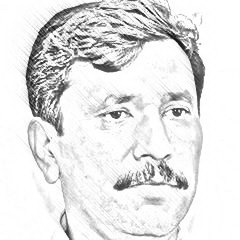The celebration of historic low inflation in Pakistan-often touted as a sign of fiscal success-masks a much deeper and more alarming issue: the erosion of democratic freedoms. The Shahbaz regime, heralding a 1% inflation rate as an achievement, has successfully managed to pull off what seems to be an economic victory, but the cost has been exorbitant, not just for the economy, but for the people’s basic rights and freedoms.
While low inflation is traditionally seen as a mark of good governance, the government has achieved this through means that raise serious concerns about the future of democracy in Pakistan. By implementing measures like a 12% policy rate, slapping high taxes on essentials like food and energy, and withdrawing subsidies, the government has sought to suppress inflation at the cost of real economic progress. The result? A stagnating economy, paralyzed investment, and a workforce in crisis.
The 12% policy rate, which, far from taming inflation, has weighed down businesses and crushed consumer demand. In a typical market, high interest rates are meant to curb excessive borrowing and spending, but in Pakistan, they have forced businesses to hold back, shutting down factories and delaying investments. Startups and entrepreneurs, once brimming with ambition, have been boxed out of the market by unsustainable credit costs. The result is a deepened stagnation, with industries once teeming with activity, like textiles and construction, now laying dormant, unable to innovate or expand.
The deliberate suppression of demand has done more than strangle growth; it has undermined the very fabric of Pakistan’s democracy. By slapping taxes on essential goods, families are left struggling to meet basic needs. As consumption falls, so too does economic vitality. Households, particularly the middle and lower classes, now face the impossible dilemma of cutting back on their daily necessities or enduring the crushing burden of rising living costs. But while the masses tighten their belts, the ruling elite remains largely insulated, shielded by loopholes and exemptions that allow them to avoid the harshest economic realities.
What Pakistan needs is not more coercive measures to suppress inflation but a shift in approach-one that stimulates growth, restores confidence, and opens up space for democratic debate.
This suppression of demand has also been paralleled by the withdrawal of subsidies, leaving vulnerable populations with nowhere to turn. The government’s move to phase out subsidies has compounded the plight of millions, pushing them closer to the edge of survival. The message is clear: economic mobility is no longer a realistic aspiration for the majority. Survival, under these circumstances, is the only option available, and for many, it’s becoming increasingly unattainable.
But the story doesn’t end with the economy. The government’s measures to control demand have been paired with a systematic attack on democratic rights. Media censorship, the curbing of dissent, and the suppression of protests have ensured that public discontent over these policies is either silenced or ignored. Those who dare to speak out against the government’s economic agenda are shut down, their voices muffled, their protests quashed. This stifling of free expression has allowed the regime to push through measures that would otherwise be subject to public scrutiny and debate.
When the government fears public discourse, it reveals its insecurity. The refusal to allow open debate on economic policies, coupled with the silencing of dissent, signals a regime more interested in maintaining power than in fostering democratic accountability. By turning media outlets into mouthpieces for its agenda and restricting the right to protest, the government has created a reality where only its narrative prevails, and all challenges to its economic decisions are suppressed.
This blend of economic coercion and political repression is what constitutes Pakistan’s modern democratic deficit. As inflation is kept low through measures that choke growth and stifle opportunity, the democratic space shrinks further. Media freedom, the bedrock of a healthy democracy, is eroded, and dissent is seen not as a vital check on power but as a threat to the state’s narrative. In this context, the claim of low inflation becomes little more than a smokescreen for a deeper and more troubling reality.
While the regime pats itself on the back for curbing inflation, it has overlooked the long-term implications of its actions. Economic stagnation, rising unemployment, and a growing disillusionment among the populace are clear indicators that Pakistan’s economic policies are backfiring. The reality on the ground, however, is starkly different from the rosy picture painted by the government. Job losses are mounting, businesses are pulling back, and young graduates find themselves staring into an empty job market.
Investment, once seen as the lifeblood of any economy, has dried up under the weight of these policies. Foreign investors are hesitant, wary of an economic climate where the cost of doing business is high, and the risks of doing so are even higher. Local entrepreneurs, once full of hope and drive, have seen their dreams dashed as high interest rates and a lack of access to credit stymie their efforts to build businesses. The economy has ground to a halt, and without a shift in policies, it will continue to flounder.
What Pakistan needs is not more coercive measures to suppress inflation but a shift in approach-one that stimulates growth, restores confidence, and opens up space for democratic debate. Lower interest rates, targeted subsidies for the vulnerable and fairer taxation are necessary to reinvigorate the economy. However, these economic reforms must be accompanied by a restoration of democratic rights. The right to dissent, the freedom to protest, and the ability to challenge government policies in the media must be safeguarded if the country is to reclaim its democratic space.
The writer is an Islamabad-based veteran journalist and an independent researcher. He can be reached on Twitter @riazmissen
